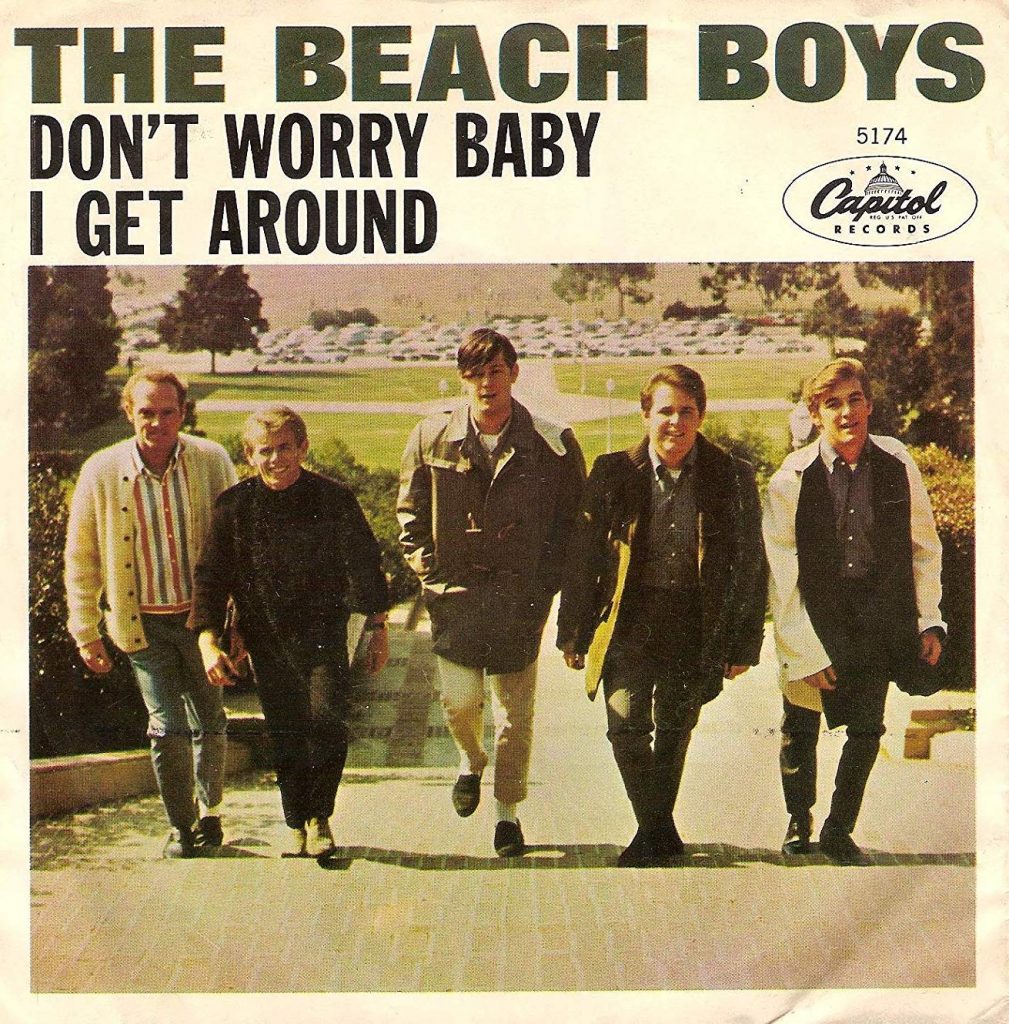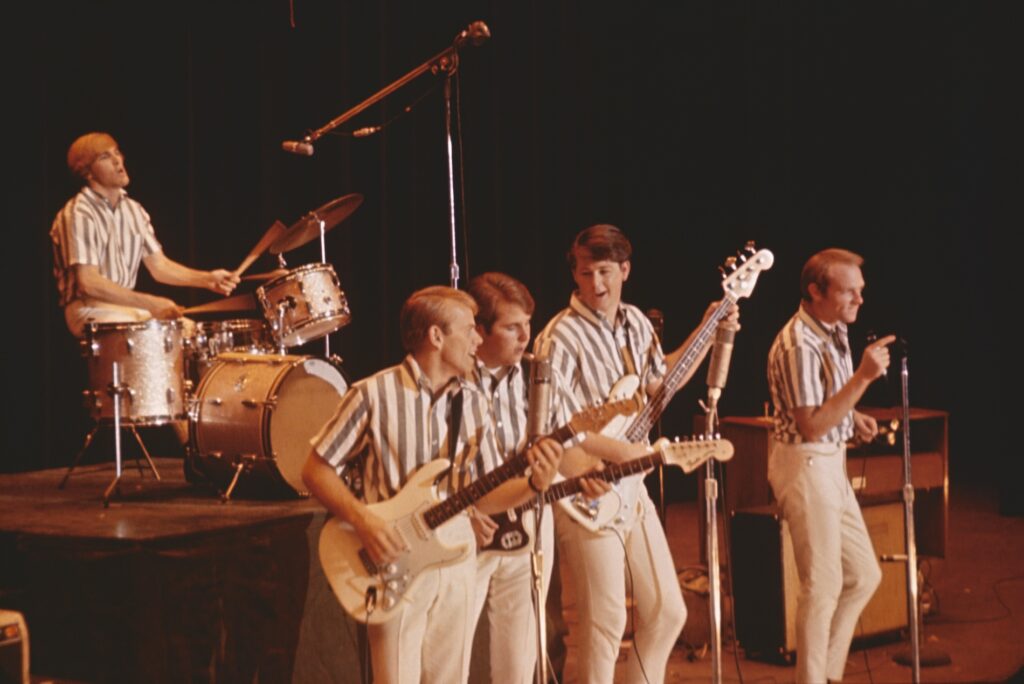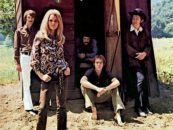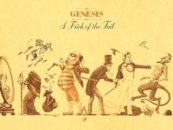Brian Wilson & the Beach Boys’ ‘Don’t Worry Baby’: Instant Inspiration
by Colin Fleming The love song is the staple of staples of all popular songwriting. The idea of love, union, romance, is often beside the point, which is instead is a matter of melody or lyrics that instantly become a part of our memories such that we take them forward with us out into the world.
The love song is the staple of staples of all popular songwriting. The idea of love, union, romance, is often beside the point, which is instead is a matter of melody or lyrics that instantly become a part of our memories such that we take them forward with us out into the world.
Love songs became so much the norm over the first decade of rock and roll that come 1964 it was as if no one was expecting anything new from them, and certainly not the plumbing of depths. But if there was a memo that love itself had become ancillary and definitely not the point of writing, recording and desiring to get a song to people, then it never found its way to Brian Wilson when he got to making “Don’t Worry Baby.”
Few people have ever loved a record—and were as in love with a record—as Brian Wilson loved the Ronettes’ 1963 single, “Be My Baby.” He took it to his heart as John Peel would later embrace the Undertones’ “Teenage Kicks” or Orson Welles did the sonorous works of Shakespeare, which is to say, in a manner of unconditional openness and appreciation for that which had been added to a life and would always be important to that life.

The Beach Boys perform onstage circa 1964 in California. (L-R) Dennis Wilson, Al Jardine, Carl Wilson, Brian Wilson, Mike Love. (Photo by Michael Ochs Archives/Getty Images; used with permission)
Sometimes there is nothing we can love better than a work of art we believe amplifies the essence of who we are and who we discover, as a result, we may become and are in part already becoming on account of what we have read, seen, heard. Wilson thrilled to producer Phil Spector’s tsunami of sound that defined the Ronettes’ disc, with Ronnie Spector’s lead vocal cutting through the exhilarating, rolling Wagnerian thunder like a beacon lighting the path to where one’s heart has resolved they must go. It’s a song that instantly inspires whoever hears it, which for Wilson meant an upsurge in creative energy regarding what he could do with a love song, but minus Spector’s Wall of Sound.
Wilson didn’t need the latter; he had other ideas in mind—a mountain of vulnerability and honesty, which no one had yet to scale in rock and roll as Wilson and The Beach Boys were about to when they repaired to Hollywood’s Gold Star Studios in early January 1964 and cut the song that is as deathless as true love itself.
“Don’t Worry Baby”—and yes, the title is meant to touch however lightly on that of the earlier Ronettes’ song—features what could be the most outstanding example of the Beach Boys’ characteristically immersive vocal polyphonies, in part because of how they seem to abet Brian Wilson’s lead, largely-falsetto vocal in stepping clear and out on its own in a sort of dance of the self, a declaration of culpability and the essential human need for connection.
Listen to the original recording in this official Beach Boys video
Rock and roll didn’t always deal in machismo, but there was an expectation of stereotypical toughness from male singers in groups whose members were a certain age, but with “Don’t Worry Baby” it was as if Wilson couldn’t have less of an interest in anything in the world than playing to expectations. Shakespeare’s Lear—in a moment of clarity—opined that nothing can come of nothing. Here was Brian Wilson, for the first time in his career, going for everything and giving all of himself, which is both the best way to make art and to love.
Wilson let loose a wave—rather than put up a wall—of emotion. It’s never discussed in this fashion, but “Don’t Worry Baby” was a protest song, giving voice to the idea that men needn’t be “hard” and “tough,” while challenging the conception of what strength is. The song reveals toughness in its candor, its naked humanness. Our narrator is a man who is in need of the strength that he believes the woman he is with provides—which is to say, she helps him locate the necessary strength within himself.
Related: Our Album Rewind of the Beach Boys’ Wild Honey album
Honest self-assessment numbered among the greatest rarities in rock and roll in 1964, and always has, if we’re also being honest. John Lennon cited “Help!” and “Strawberry Fields Forever” as the only two honest songs that he composed, and “Don’t Worry Baby” is right there with both.
Listen: Among those who loved “Don’t Worry Baby” was the Ronettes’ Ronnie Spector, who inspired Brian Wilson, then covered his song
The singer in some of Buddy Holly’s songs would give you the straight-up lowdown on what he was going through and feeling, but it made for a shocking moment in the evolution of popular songwriting when Wilson’s narrator says, “I guess I should have kept my mouth shut/When I started to brag about my car”—a boast to impress the singer’s peers, and likely this young woman with whom he’s besotted. We sense that this was an earlier period in their relationship, before the putting of such childish things behind him. We recognize that concept—expressed so lucidly from the Bible—but you don’t expect to encounter a living example of the idea within a pop song.
Cars were central to that first decade of rock and roll. You wowed your buddies and your girl with them. You loved your car, tinkered with your car, made loud noises with your car, lamented your car as if dealing with the loss of life when rainwater got under her hood. But what you didn’t do until “Don’t Worry Baby” was realize how immature you’d been, and how you were holding yourself back, on account of your insecurity as it manifested itself in an example pertaining to your car. All of life is a challenge of growing up, regardless of our age. Here we have the first song—or at least the first song that played on American radio—to codify this inescapable truth.
Listen: The Beach Boys recut the song in 1996 with singer Lorrie Morgan handling the lead
For all the talk of Wilson’s genius with Pet Sounds and the Smile project, there’s no more representative piece of work to play for a visiting alien as testament to Wilson’s gifts than “Don’t Worry Baby.” He sings the song–released originally as the B-side to the smash single “I Get Around”–as if his life depended on it, and you know what? In a sense, this is exactly what our lives depend upon.
The song makes felicitous use of metaphor and it’s also frank. We know that when the singer says that this woman looks in his eyes during lovemaking that he means the physical act of sex. How did the Beach Boys get away with this? There’s nothing for shock. This song is in total good faith. It is meant to be true and it resonates as truth. Let it enter the record, then, as all truth ought to.
The singer has a race to undertake in his car, but we know that coming in first or last isn’t what any of this is about. “Don’t Worry Baby” is a song of personal accountability, and of the unveiling, rather than masking of feelings. There are no guarantees that the endeavor will go well, but because this is also a song of trust—both between singer and the woman he loves, and the singer and us—it’s a song of quiet bravery. When we encounter bravery that doesn’t make a show of itself, we are roused to our own version of this courage.
Watch a later version of the song sung by Carl Wilson
Wilson’s vocal puts the whole of the singer on the line. There are no half-measures here. You are in awe of its openness. The tone-painting is as detailed as what we get in something like Thomas Weelkes’ “As Vesta was descending.” There’s a holiness to the song, the filling of sacred space, but secular sacred space. When we love, that love feels otherworldly to us, so precious as to be divine, but the person we love may be right there, holding our hand. Or we may not be with them yet as we wish to be, or with ourselves as we’d also need to be.
“Don’t Worry Baby” is the song that best understands how this space must be filled if we are to love the best that we can, in the various ways of love, including how we might love a song such as this one.
Listen to a live version of “Don’t Worry Baby” from 1964
The Beach Boys’ recordings are available in the U.S. here and in the U.K. here.






2 Comments so far
Jump into a conversationAmen. His and their greatest song.
The first time I heard it I was in my brother’s car. He pulled off to the side of road and blasted it!
Still do.
Zenith!